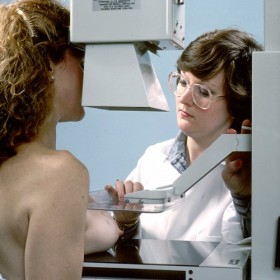 Breast cancer – the most common cancer among American women (except for skin cancer) – is of vital concern to us, with about 1 in 8 eventually developing the disease. While about 40,000 women die from the disease each year, survival rates have significantly improved over the past 50 years – some say because of better screening, others believe because of enhanced treatment regimens. So it’s not surprising that women debate with each other and question their doctors when new data or policy changes emerge.
Breast cancer – the most common cancer among American women (except for skin cancer) – is of vital concern to us, with about 1 in 8 eventually developing the disease. While about 40,000 women die from the disease each year, survival rates have significantly improved over the past 50 years – some say because of better screening, others believe because of enhanced treatment regimens. So it’s not surprising that women debate with each other and question their doctors when new data or policy changes emerge.
After the U.S. Preventive Services Task Force changed mammography screening guidelines several years ago – to begin at age 50 and continue every two years – women and doctors urged Health and Human Services to reconsider promoting those new recommendations. Most women continue to follow American Cancer Society guidelines and request annual screening beginning at age 40.
Now another controversy about breast cancer screening has been generated by a recent Canadian study, published last week in the British Medical Journal. The researchers followed almost 90,000 women aged 40-59 for 25-years. One group was randomly assigned to receive annual mammography screening during the first five years of the study; the control group had no mammography during that time. Both groups received physical examinations and instruction in breast self-exam. During the following 20 years, researchers consulted national statistical databases to determine the incidence of cancer and death in these women. The main outcome variable the researchers considered was death from breast cancer. The researchers conclude that there was not a significant increase in lives saved due to the screening regimen.
How have you reacted to this information? What do you plan to do about it? Here are some suggestions to consider as you weigh the pros and cons of your screening mammography.
Read the research article yourself. Don’t just depend on information coming from a newspaper article or a short Internet piece. You can find the full paper by Anthony Miller, et al., on the BMJ website.
Confer with your physician. There have been critiques of the study that your doctor can discuss with you – statements about improper randomization as well as inferior mammography technique and equipment – that could have affected the survival rates noted in the study and therefore might have led to faulty conclusions.
Don’t rush into any major decisions. You deserve to give full consideration to something so important to your health and wellbeing. Take your time to digest all of the facts and opinions.
Continue good self-care. In the meantime, do what you can to maintain a healthy lifestyle. Read one of my posts about how walking at least 7 hours a week has been linked to a reduced risk of developing breast cancer.
As a breast cancer survivor myself – 27 years and counting – I’ve focused on achieving a sense of control by continuing with my medical follow-ups and my exercise routine as well as remaining connected to the community.










2 Responses to Confused about getting a mammogram?